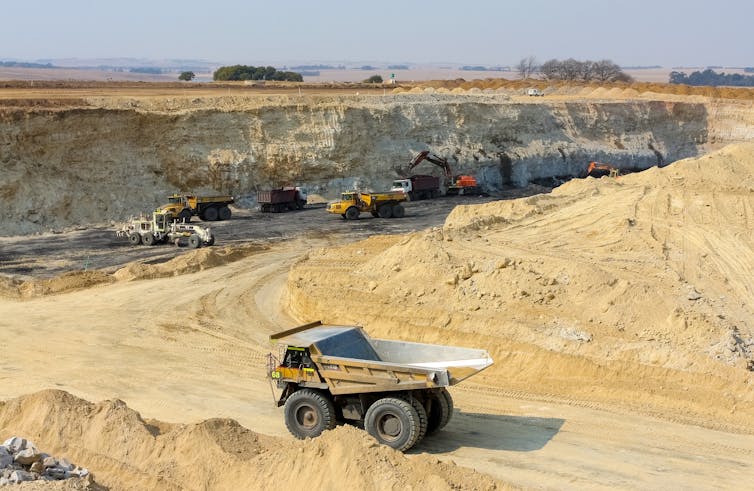
Llewellyn Leonard, University of South Africa
Some of the most profitable South African mines are situated in the areas of the country that are home to traditional communities and are governed in terms of customary law.
Many of these developments have led to the destruction of the natural environment. And mining activities have also disrupted local ways of life. For example, residential homes have been destroyed. In others, violence has erupted within communities leading to the deaths of people opposed to mining.
On top of this communities rarely benefit from mining. Instead, they’re exposed to pollution and health risks as well as disruptions to their livelihoods.
Unfortunately, communities are often let down by traditional leaders who are meant to represent their interests. Some have acted as barriers to local community participation and decision making. And some have entered into deals with the mining companies for personal profit, without local community consent.
There have been legal cases. For example, over a decade ago the Bakgatla-ba-Kgafela traditional community attempted to hold their traditional leader to account over assets and revenue derived from mining operations. The traditional leader sought an interdict against villagers from holding public meetings to discuss community concerns about mining and corruption. In the end the traditional leader was convicted of theft and corruption.
I conducted a study in the community of Fuleni located in Northern KwaZulu-Natal near the Great St Lucia Wetland Park, where a coal mining company is attempting to develop an anthracite open cast coal mine.
My fieldwork centred on the role of traditional leaders in the area. I conducted research spread over a year in Fuleni and neighbouring Somkele, and as part of a larger study on mining in South Africa. My findings included the fact that corruption played a role in blocking the local community’s concerns being taken on board when mining licences were considered. I also found that mining conglomerates exercise more control over the government and traditional chiefs than local communities.
The research
I interviewed key social actors. These included local community residents fighting mining, youth groups and civil society organisations that were providing support to the local community.
I found that there was a lack of transparency on how decisions were made about mining developments within the Fuleni traditional council. And that decisions weren’t in the interest of the community. The support for mining development within the traditional council was due to benefits received from mining development.
I also found that South Africa’s laws weren’t being enforced.
Firstly, the South African Constitution protects peoples’ right to transparency, accountability and justice. These conditions were not being met.
In addition, specific laws – such as the 1998 National Waste Management Strategy and the 1998 National Environmental Management Act – designed to protect the environment were also being flouted.
These laws all point to the fact that the state has a duty to ensure that communities’ interests are genuinely taken into account during decision making processes over mining developments.
In addition, mining companies need to ensure that they’re operating within the law and to ensure that proper rehabilitation of the environment is done post-mining operations.
Another big challenge is monitoring the impact of mining once a licence is granted. A lack of human resources at all government levels means that this is done unevenly. As a result mining companies take advantage of enforcement loopholes.
Traditional leaders
Another major challenge is that the government is proposing new regulations that would strengthen the powers of traditional leaders. Traditional leaders often purport to be the only community representatives in negotiation processes with mining companies.
But reasserting the proprietary powers of chiefs in the name of “custom” would create a situation in which land could be indirectly transferred to mining corporations.
Even as things stand, communities are left vulnerable to exploitation by traditional leaders, mining companies and government. This is because of a lack of transparency – nobody knows what deals traditional leaders have done – is compounded by weaknesses in the regulatory framework. A sound framework would ensure genuine consultation, consent, and downward accountability in mining communities.
So far government has distanced itself from the challenges faced by mining affected communities. It needs to adopt a co-ordinated and integrated environmental management approach when it considers mining development and applications. And effective governance won’t happen unless the government and industry are transparent and employ credible participatory processes.
Llewellyn Leonard, Professor Environmental Science, University of South Africa
This article is republished from The Conversation under a Creative Commons license. Read the original article.
